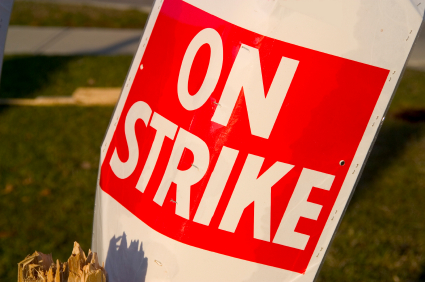This is the number of work days lost to strikes in 2023 by all those who were called out on strike by their union.
Bargaining Chip or Billy Club?
Why Do Unions Strike?
- When a contract comes back from the negotiating table, employees are generally given only two options by the union:
- Accept the contract in whatever form negotiated by the union, or
- Reject the contract and vote to strike
- If the union votes to strike, the union forces the employees to stop working, hoping to pressure the company into agreement.
BUT, THERE’S MORE TO THE STORY: When a union begins to negotiate with a company, the only bargaining chips it brings to the table are the threat of strike, and the current pay and benefits of the workforce
- Sometimes a union uses a strike as a hammer against its own members to pressure the employees to accept a contract that contains everything the union wanted, but very little of what the employees were told they could expect
- Often, a union member’s only option is to support a contract he or she doesn’t like in order to avoid having to go out on strike

What does the union really use the strike threat for?
This is the average number of days a striking employee was on the picket line or off the job in 2023.
What happens to you while on strike? You get no pay or benefits from the company and if you are on strike over contract demands – what is known as an economic strike – you can be permanently replaced. Sure the union has bargaining chips when they come to the table. The problem is if they have to use them you are on a picket line while union officials continue to get their pay and benefits. What does the union offer you to walk away from a paycheck and all of your health benefits? The typical union strike fund authorizes around $150 per week, only after you’ve been on strike for 2 weeks, and assuming they have the money in the strike fund to make the payments. You need to be aware of the risk in a unionized environment.
When the union makes promises that it will get you something– all it is really saying is that it will ASK for it at the bargaining table; if the union demands are too unreasonable, the only option at that point is to try to FORCE the company to agree, or you to agree, and the way a union does that is by threatening to use the strike.
This website is provided as a resource for you and your family, as you consider whether or not to support union organizing efforts.
Whether to unionize is an extremely important decision. If voted in, a union would speak for you regarding all terms and conditions of your employment, including:
- your current and future pay
- the cost and structure of your health and other insurance plans, retirement plan and other benefits you currently enjoy
- your holidays, vacation and other forms of paid and unpaid leave
- whether many employment-related decisions are based on your merit, or simply upon your date of service
- whether you will have union dues deducted from your paycheck, and how much?
- the potential for strikes and possible permanent replacement during an economic strike